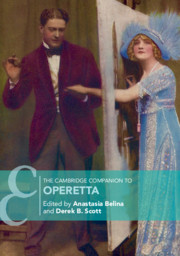Book contents
- The Cambridge Companion to Operetta
- Cambridge Companions to Music
- The Cambridge Companion to Operetta
- Copyright page
- Contents
- Illustrations
- Tables
- Music Examples
- Notes on Contributors
- Chronology, 1855–1950
- Introduction
- Part I Early Centres of Operetta
- 1 French Operetta: Offenbach and Company
- 2 Viennese Golden-Age Operetta: Drinking, Dancing and Social Criticism in a Multi-Ethnic Empire
- 3 London and Gilbert and Sullivan
- 4 Hungarians and Hungarianisms in Operetta and Folk Plays in the Late-Habsburg and Post-Habsburg Era
- 5 Operetta in the Czech National Revival: The Provisional Theatre Years
- Part II The Global Expansion of Operetta
- Part III Operetta since 1900
- Select Bibliography
- Index
- References
1 - French Operetta: Offenbach and Company
from Part I - Early Centres of Operetta
Published online by Cambridge University Press: 14 November 2019
- The Cambridge Companion to Operetta
- Cambridge Companions to Music
- The Cambridge Companion to Operetta
- Copyright page
- Contents
- Illustrations
- Tables
- Music Examples
- Notes on Contributors
- Chronology, 1855–1950
- Introduction
- Part I Early Centres of Operetta
- 1 French Operetta: Offenbach and Company
- 2 Viennese Golden-Age Operetta: Drinking, Dancing and Social Criticism in a Multi-Ethnic Empire
- 3 London and Gilbert and Sullivan
- 4 Hungarians and Hungarianisms in Operetta and Folk Plays in the Late-Habsburg and Post-Habsburg Era
- 5 Operetta in the Czech National Revival: The Provisional Theatre Years
- Part II The Global Expansion of Operetta
- Part III Operetta since 1900
- Select Bibliography
- Index
- References
Summary
This chapter examines the work and significance of Offenbach in the field of French operetta. With the rise of Napoleon III in the 1850s, a combination of political optimism, renewed prosperity, an abundance of artistic talent and a cultural obsession with appearances made Paris the perfect environment for a new form of entertainment to appear and thrive – operetta. Pioneered by Hervé, it became an international sensation thanks to the creativity and determination of Jacques Offenbach, whose opéras bouffes remain the musical embodiments of France’s Second Empire. He composed and produced dozens of hits that took comic aim at the foibles of all levels of society, from beggars to the royal court. With France’s humiliating defeat in the Franco-Prussian War of 1870, the Parisian public briefly turned against the German-born Offenbach. But he found new success by composing light-hearted spectacles. Composer Charles Lecoq, whose career took off thanks to Offenbach, achieved a major success with La fille de Madame Angot. Lecoq and others continued to compose operettas for Parisian audiences, but none matched the popularity French operetta had enjoyed with Offenbach.
- Type
- Chapter
- Information
- The Cambridge Companion to Operetta , pp. 17 - 31Publisher: Cambridge University PressPrint publication year: 2019

